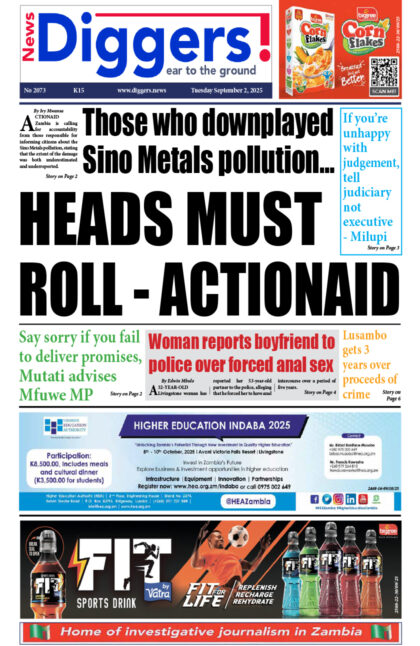MINISTRY of Health Permanent Secretary for Technical Services Professor Luckson Kasonka says investigations into how much was paid to Honeybee Pharmacy are ongoing because some documents were hidden.
And Prof Kasonka says starting today, people will see a lot of drugs in hospitals but warns against pilferage and wastage.
In an interview, Prof Kasonka insisted that he didn’t know how much was paid to Honeybee, saying transactions had been secretive.
“Some money was paid but I don’t know how much. It has been a very secretive transaction, a lot of documents have been hidden that are not there, so it is difficult for me to say. We did not find some of the documents. The necessary procurement was not open. It was a very shady deal I must say. It is under investigation. Remember it is a big scandal that is under investigation with different investigative wings. I will not be in the correct position to start dwelling into [that] and mentioning details until the investigations are completed,” Prof Kasonka said.
And Prof Kasonka said measures would be put in place to prevent the pilferage of drugs.
“I want you to see how many trucks will be delivering medicines at ZAMMSA. So, from tomorrow, you will see a lot of medicines in the hospitals. When the medicines are in the hospitals, remember what is important is to ensure how we [will] secure those medicines. It is not a question of buying. We can buy it but within two months they will go because people get excited now they start pilfering, that is my biggest concern. So, it is about prevention against pilfering and also prescription habits so that only those who need the right medicines are given. You have seen people go to the hospital and come back with loads of tablets to take home and people don’t even take those medicines because they are not necessary to start with, but someone prescribed without thinking whether the prescription was necessary or not,” he said.
“It is not every illness that requires medicine and it is not the number of medicines that shows that I am treating you well, no. So, a lot of wastage goes into this because some practitioners just prescribe because it is there, that is my worry. So when the medicines go in there, prescriptions should be monitored by senior members of the districts so that only the necessary prescription is made. You will agree with me sometimes when you go to visit your relatives, you find that the patient has so many medicines by her bedside, by the time she gets well, so many medicines will have remained, that is how we waste medicines, that is how we waste government money. That is how sometimes medicine runs out from hospitals because those remnants of medicines are supposed to be in the pharmacy so that another person goes to the hospital and finds them.”
Prof Kasonka said any health worker found with unprescribed medicines in their homes would be made to account for them.
“So, it is not about the government failing to procure, money is there but it is about looking at all these aspects that influence management of medicines in public health centres. We are having discussions with suppliers that anyone who supplies medicines to ZAMMSA should be able to label, ‘produced for GRZ’, that way in the long term we will have no problem with medicines,” said Prof Kasonka.
“When the medicines are in, I will make sure that the medicines are safe and secure and given only to the intended patients. We will do a campaign that any health worker who is found with medicines that is not prescribed in their house, constitutes an offence, that is theft of medicine from the government. All the medicine that is not in use should stay in the pharmacy. If you are a nurse, a doctor and you are found with medicines, you have to explain why, because that is government money you are keeping in your house.”
























